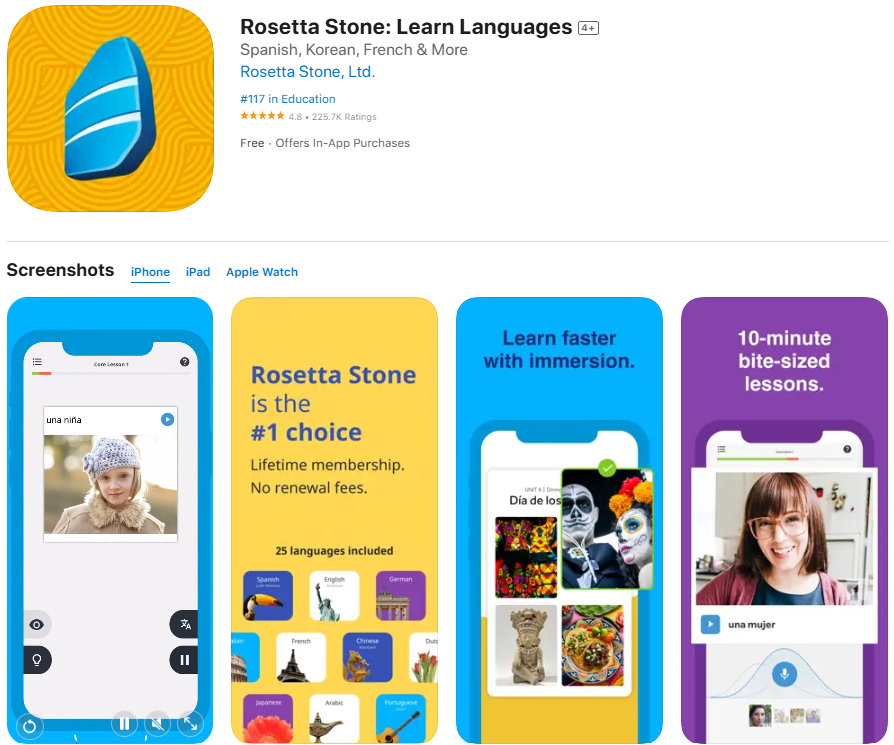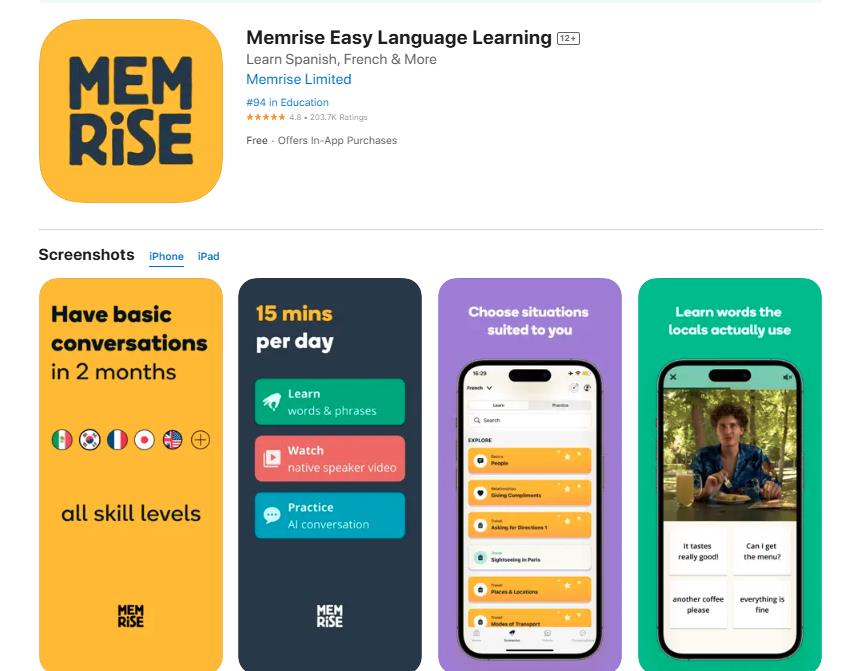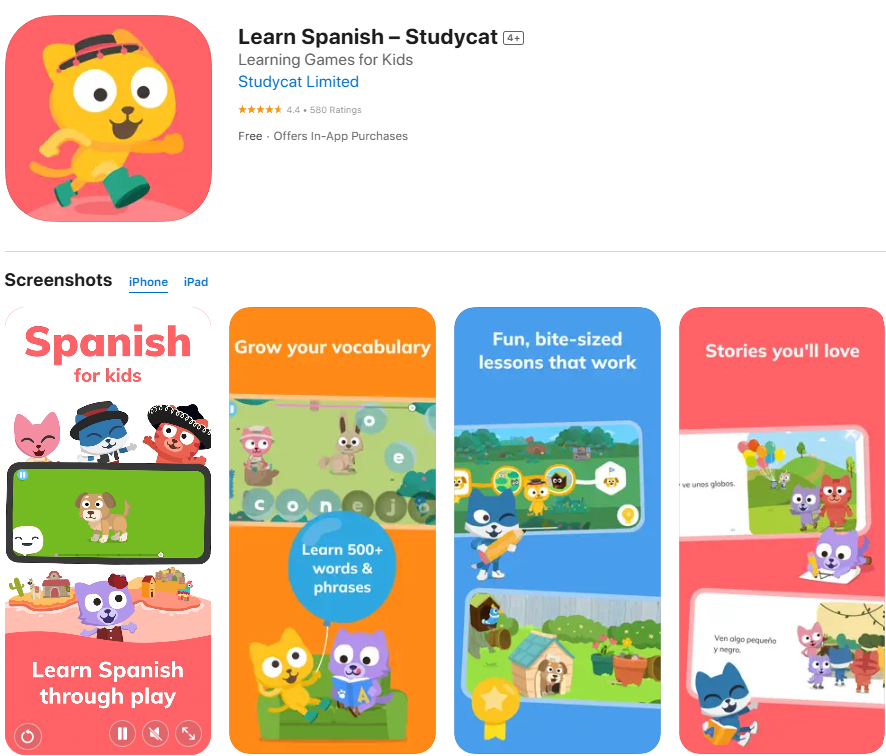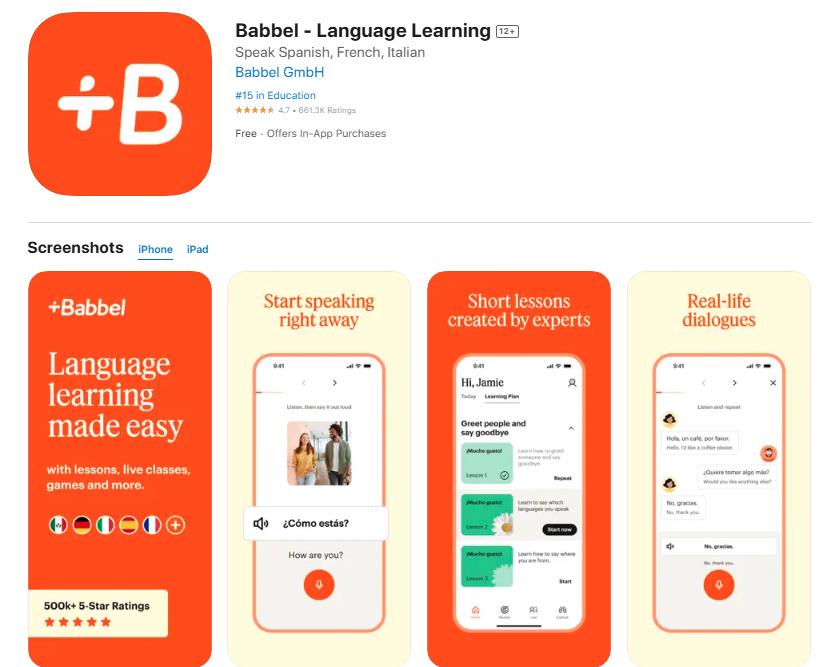In today’s world, education is no longer limited to the classroom and language learning apps have become a valuable tool for students of all ages. Whether you're studying for school, preparing for exams, looking to teach your child a new language, or aiming to strengthen your communication in a foreign language, the right app or platform can support academic success.
Key Takeaways:
- ⭐ Top Choice for Academic Progress: GoStudent offers personalised online tutoring with vetted language tutors, ideal for students needing structured, school-aligned support.
- 🔓 Flexible Private Tutoring: FindTutors allows you to choose your own tutor and set your own pace, offering flexibility.
- 🧩 Accessible for Beginners: Duolingo’s gamified, bite-sized lessons are good for habit-building and basic vocabulary.
- 📘 Practical and Structured: Babbel provides step-by-step language courses focused on grammar and real-life topics, suited to older learners.
- 🎧 Real-World Listening Practice: Memrise uses native-speaker videos for casual phrase learning and listening skills.
- 🎨 Fun for Young Kids: Studycat teaches through music, games, and animation, designed specifically for younger children.
- 🌍 Immersive Learning: Rosetta Stone focuses on self-paced, full-sentence immersion with speech recognition technology.
- 💡 Free vs Paid Options: Many apps include a free version, but advanced features like live tutors or AI tools typically require a subscription or in-app purchases.
From structured language lessons with live tutors to gamified tools that teach vocabulary through play, there’s a wide range of options available. Some are designed to reinforce school learning, while others focus on building speaking skills, listening skills, or everyday vocabulary at your own pace.
This guide compares some of the best apps for language learners, outlining their strengths, pricing, and suitability for different learners, including those in school, beginners, and even advanced learners preparing for more formal assessments.
7 Best Language Apps: Feature and Pricing Overview
|
Platform |
Best For |
Languages Offered |
UK Pricing (2025) |
|---|---|---|---|
|
GoStudent |
Personalised academic tutoring |
10+ |
From £21.99/lesson |
|
FindTutors |
Flexible private tutoring |
40+ |
£10–£40/hour + £19/month |
|
Duolingo |
Beginners & habit building |
40+ |
£4.99/month or £48/year |
|
Memrise |
Real-world listening & vocabulary |
39 |
£24.85/month or £63/year |
|
Studycat |
Playful learning for young children |
5 |
~£11/month |
|
Rosetta Stone |
Structured, self-paced learning |
25 |
3 months: ~£32 12 months ~£112 total Lifetime~£339 |
|
Babbel |
Grammar-focused, practical learning |
14 |
From £10/month |
What is the #1 best language learning app?
It’s tempting to look for a single winner, but the best language app really depends on your needs, goals, and learning style. If you're aiming for school support, a tutor-led platform like GoStudent might be right. Prefer short, game-like lessons? A self-paced app could work better.
Think about your goals, how you like to learn, and whether you need structure or flexibility. Once you know that, it’s easier to choose something that actually helps you stick with it and make progress.
7 Best Apps to Learn a New Language
1. GoStudent: Best App for Structured Language Tutoring and Academic Support

GoStudent app provides online tutoring in school subjects like Spanish, French, German, Italian, and English, offering academic-focused language support that aligns with what students learn in class.
GoStudent is one of the best language learning platforms for learners who want individual online support. It offers live classes with private language teachers, focusing on conversational fluency, grammar, exam prep, and more. Lessons are adapted to each student, with structured goals and regular feedback.
Unlike other language apps that rely on passive practice, GoStudent prioritises human interaction, every tutor is thoroughly tested and trained to ensure high-quality, effective teaching. This makes it a top choice for families and serious learners alike.
How it suits kids: GoStudent is especially trusted by parents. Its vetted tutors are experienced in working with children, using interactive activities and age-appropriate content. Lessons follow the Common European Framework and align with school requirements, helping children learn a new language and perform better in class.
How does GoStudent work?
After a short consultation, GoStudent matches the student with a tutor based on their language level, learning style, and academic needs. Lessons take place in GoStudent’s virtual classroom, with interactive tools and flexible scheduling. Parents can track progress, receive feedback, and adjust learning plans as needed, making it a reliable option for ongoing school support or exam preparation.
GoStudent Pricing:
- Free trial lesson available
- Lessons from £21.99 (discounts for package bookings)
How Does GoStudent Compare to Other Apps?
- GoStudent vs FindTutors: GoStudent provides structured, curriculum-aligned lessons with vetted tutors, ideal for learners who need consistency and academic support. FindTutors offers greater flexibility and choice, allowing you to select from a wide range of tutors, subjects, and pricing.
- GoStudent vs Duolingo: Duolingo is gamified and good for basic vocabulary. GoStudent offers real tutors and personalised support for deeper learning.
- GoStudent vs Rosetta Stone: Rosetta Stone uses self-paced immersion. GoStudent adds real-time human feedback and tailored lessons.
- GoStudent vs Memrise: Memrise focuses on vocabulary and listening. GoStudent covers all skills with live instruction and school-aligned content.
- GoStudent vs Babbel: Babbel has structured lessons focused on grammar and vocabulary. GoStudent goes further with live, personalised instruction aligned to school goals.
2. FindTutors: Flexible Tutoring on Your Terms

FindTutors is an open tutoring marketplace that connects you with thousands of tutors offering private language lessons. You can set your budget, schedule, and learning focus, whether you’re preparing for an exam, building conversation skills, or simply learning a new language.
How it suits kids: Many tutors specialise in teaching school-age children and tailor their engaging lessons to match attention spans and academic needs. Parents can search by tutor location, subject focus, and availability to ensure the right match. It is a useful option for families looking for flexibility and direct control.
How many languages are available on FindTutors?
FindTutors app offers lessons in 40+ different languages, taught by independent and native tutors. You can choose from multiple languages including Spanish, French, German, Italian, English, and many more.
FindTutors Pricing:
- Basic Class Request: £9.90 one-time
- StudentPass: £19/month for unlimited tutor contacts
- Lessons: £10–£40/hour depending on tutor
FindTutors gives you the freedom to choose your own tutor, set your own pace, and focus on what matters most, whether that's conversation practice, exam prep, or helping a child build confidence in a new language.
3. Duolingo: A Simple Start for Beginners

Duolingo remains one of the most popular language learning apps thanks to its gamified format, easy-to-use interface, and short, bite-sized lessons. It offers courses in over 40 languages. Its lessons focus on basic vocabulary, sentence structure, and daily practice habits, making it ideal for casual learners.
How it suits kids: Duolingo’s visual design and interactive activities appeal to children aged 8+. It’s a fun way to build new words into daily habits, but younger learners may need help from parents to fully grasp grammar or progress beyond basic features. It’s also worth noting that the free version contains ads and limited access to advanced exercises.
Duolingo Pricing:
- Free with ads
- Super Duolingo: £4.99/month or £48/year
- Family Plan: £89.99/year for up to 6 users
⭐Duolingo App Ratings:
- Google Play: 4.6★ (31M reviews)
- App Store: 4.8★ (3.8M ratings)
Duolingo makes it easy to build a daily habit and pick up vocabulary through short, playful lessons, a solid starting point for beginners of all ages.
4. Rosetta Stone: Structured Language Learning at Your Own Pace
 Rosetta Stone is a well-established name in language learning software, known for its immersive method and voice-driven lessons in 25 languages. It focuses on building sentences from the start and includes speech recognition to support correct pronunciation.
Rosetta Stone is a well-established name in language learning software, known for its immersive method and voice-driven lessons in 25 languages. It focuses on building sentences from the start and includes speech recognition to support correct pronunciation.
How it suits kids: While not specifically made for children, Rosetta Stone’s visual design and structured lessons can work well for older kids (10+) with reading skills and the ability to learn at their own pace. Parents may want to supervise early lessons or set goals together to keep younger learners motivated.
⭐ Rosetta Stone App Ratings:
- Google Play: 4.4★ (394K reviews)
- App Store: 4.8★ (225K ratings)
Rosetta Stone Pricing (UK – 2025)
- 3 months (1 language): ~£32 total (after discount)
- 12 months (1 language): ~£112 total
- Lifetime (all 25 languages): ~£339 one-time payment
Is Duolingo or Rosetta Stone better?
Duolingo is better for beginners looking for a free, gamified app to build vocabulary and habits. Rosetta Stone is more structured and suitable for learners who prefer immersive lessons and a long-term approach. The better option depends on your learning goals and preferred style.
5. Memrise: Real-Life Language Practice with Native Speakers
 Memrise offers a more immersive learning experience than some other apps, using real-world video clips of native speakers to teach everyday vocabulary and improve listening skills. It offers 39 languages. It’s ideal for learners who want to hear authentic pronunciation and casual speech patterns from the start.
Memrise offers a more immersive learning experience than some other apps, using real-world video clips of native speakers to teach everyday vocabulary and improve listening skills. It offers 39 languages. It’s ideal for learners who want to hear authentic pronunciation and casual speech patterns from the start.
How it suits kids: Memrise works best for teens and advanced students who enjoy learning independently. Its natural speech and cultural context help older kids connect language with real-life use, especially those motivated by music, social media, or travel. Younger learners may need support due to the app’s faster pace and complex content.
⭐ Memrise App Ratings:
- Google Play: 4.6★ (1.55M reviews)
- App Store: 4.7★ (87.8K ratings)
Memrise Pricing:
- Monthly: ~£24
- Yearly: ~£63
- Lifetime: ~£169
6. Studycat: Language Learning Apps Designed for Children
 Studycat is a fun-first language learning app built specifically for young children aged 3–10. It combines songs, games, animations, and interactive activities to make early vocabulary and grammar feel like playtime. The design helps children engage without needing advanced reading skills. The app offers English, Spanish, French, German, Chinese.
Studycat is a fun-first language learning app built specifically for young children aged 3–10. It combines songs, games, animations, and interactive activities to make early vocabulary and grammar feel like playtime. The design helps children engage without needing advanced reading skills. The app offers English, Spanish, French, German, Chinese.
How it suits kids: Studycat is one of the good language learning apps for younger learners, offering an easy to use interface and a gentle introduction to a foreign language. It supports natural learning through repetition and play, a good fit for visual learners and families starting early.
⭐ Studycat App Ratings:
- Google Play: 3.9★ (19.5K reviews)
- App Store: 4.4★ (580 ratings)
Studycat Pricing:
- ~£11/month (Family Plan options available)
- In-app purchases available for extra features
7. Babbel: Step-by-Step Lessons for Practical Language Use

Babbel offers structured, level-based language lessons designed to build real-world conversation skills in 14 languages. Lessons focus on grammar, vocabulary, and sentence structure, with topics tailored to everyday situations. The app includes review exercises, AI features, and speech practice tools to reinforce learning over time.
How it suits kids: Babbel is best suited for older children or teens (12+) who are comfortable with independent learning. Its structured lessons can support school studies, but younger learners may find the format too formal or advanced without guidance.
⭐ Babbel App Ratings:
- Google Play: 4.6★ (1.06M reviews)
- App Store: 4.7★ (661.6K ratings)
Babbel Pricing:
- Free trial available (limited access)
- ~£30 for 3 months | ~£45 for 6 months | ~£60/year | ~£255/Lifetime
- Babbel Live (tutors): ~£84/month for group classes | ~£126/month for private&group classes
Is Duolingo or Babbel better?
Duolingo is better for beginners looking for a free, gamified way to build daily habits and basic vocabulary. Babbel is more suitable for learners who want structured, grammar-focused lessons for practical use. Duolingo has a generous free version, while Babbel requires a paid subscription but offers more depth and structure in return.
Final Thoughts
Whether you're aiming to support school learning, improve your speaking skills, or simply stay consistent with daily lessons, there’s no shortage of tools to help you learn a new language in a way that fits your routine. From tutor-led platforms to gamified apps, each option plays a different role in the overall learning process.
Whichever path you choose, consistency is key, and with the right support, you'll see real progress in your native language or any language you're hoping to master.
Disclaimer: This blog is based on research and experience with these apps in 2025. Pricing and features may vary depending on your location, currency, or promotions. Always check the official website or App Store/Google Play for the most current information.





